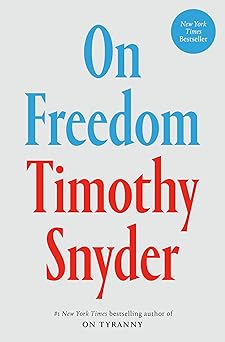
Freedom is a concept that has been deeply ingrained in the American psyche, but as we delve into its meaning, we realize that it's often misunderstood. Timothy Snyder, in his latest book, takes us on an intellectual journey to re-examine what freedom truly means and how it can be achieved. He argues that freedom is not the absence of state power, but rather the freedom to thrive, to take risks, and to work together towards a shared future.
Snyder's exploration of freedom is rooted in a deep understanding of historical events and the experiences of those who have fought for it. He draws on the work of philosophers and political dissidents, as well as conversations with contemporary thinkers, to create a comprehensive picture of what freedom looks like in practice. He emphasizes the importance of institutions and traditions, but also stresses the need for a politics of abundance, generosity, and grace. Snyder's goal is not to provide a simplistic definition of freedom, but rather to help us see the complexities and nuances of this concept. Throughout the book, he reveals that true freedom is not just about individual rights, but also about creating a society where people can thrive together. By taking the time to understand what freedom means, we can begin to design a government that allows us to flourish as individuals and as a community.
As we navigate our own complex world, Snyder's book offers a powerful and timely message. He reminds us that freedom is not a fixed state, but a dynamic and ever-evolving concept that requires continuous effort and dedication. By embracing the idea of freedom as a living, breathing value, we can begin to build a better future for ourselves and for generations to come. Snyder's book is a call to action, urging us to re-examine our assumptions about freedom and to work towards creating a society that is truly just, equitable, and free.
As I closed the pages of this thought-provoking book, I couldn't help but feel a sense of trepidation about the state of freedom in our world today. The author's introspective and nuanced exploration of this complex concept resonated deeply with me, and I found myself reflecting on the many ways in which freedom has been misunderstood and compromised.
The author's journey through the history of freedom is both a sobering reminder of the struggles that have shaped this concept and a hopeful testament to the power of human resilience and determination. I was particularly struck by the way the author wove together threads from philosophy, politics, and personal storytelling to create a rich tapestry of understanding. As I read, I couldn't help but think of my own experiences with loss and struggle, and how these experiences have often been marked by the absence of freedom and the suffocating grip of oppression. The author's words felt deeply personal and relatable, and I found myself nodding in agreement with their assertions.
What struck me most about this book was the author's emphasis on the importance of creating a society that is truly just, equitable, and free. In an era marked by increasing polarization and division, it's clear that freedom is more crucial than ever. The author's vision of freedom as a dynamic and ever-evolving concept that requires continuous effort and dedication feels both timely and timeless. As I closed the book, I felt a sense of renewed purpose and determination to work towards creating a world where people can truly thrive together. The author's book is a powerful reminder that freedom is not just a abstract concept, but a living, breathing value that requires our collective effort to flourish.
Rating: 3.0 / 5.0
Freedom is a complex and multifaceted concept that has been deeply ingrained in the American psyche, but is often misunderstood. Timothy Snyder's book takes us on an intellectual journey to re-examine what freedom truly means and how it can be achieved. He argues that freedom is not the absence of state power, but rather the freedom to thrive, to take risks, and to work together towards a shared future. Snyder stresses the importance of institutions and traditions, while also emphasizing the need for a politics of abundance, generosity, and grace. He reminds us that freedom is not a fixed state, but a dynamic and ever-evolving concept that requires continuous effort and dedication.